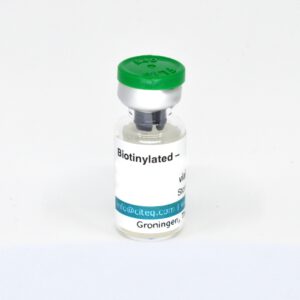Biotinylated material
Biotinylated products offer extensive applications in the field of respiratory allergy, as they are compatible with a wide range of techniques. The remarkable specificity and strength of the biotin-avidin interaction enable the detection and purification of proteins. These biotinylated products can be incorporated into various experiments involving animal models, serving as valuable tools to confirm proper immunization and assess treatment response. Furthermore, they contribute to precise research and diagnosis by facilitating the quantification of complex immune system responses.
In the process of biotinylation, biotin is attached to macromolecules or proteins, providing a versatile platform for functional group addition. This flexibility allows for the attachment of a variety of molecules. Moreover, biotinylated products can be employed in diverse experimental conditions and mediums, as the biotin-avidin interaction remains unaffected by changes in pH, temperature, and other factors. These biotinylated products can be seamlessly integrated with standard methods such as western blot analysis, fluorescence-activated cell sorting (FACS)/flow cytometry, and enzyme-linked immunosorbent assay (ELISA).
Biotinylated material
Other categories
Categories
Showing the single result
-

Biotinylated Der p 1
This specialized product is biotinylated der p 1, specifically designed for research and diagnostic...
€621.55Biotinylated products offer extensive applications in the field of respiratory allergy, as they are compatible with a wide range of techniques. The remarkable specificity and strength of the biotin-avidin interaction enable the detection and purification of proteins. These biotinylated products can be incorporated into various experiments involving animal models, serving as valuable tools to confirm proper immunization and assess treatment response. Furthermore, they contribute to precise research and diagnosis by facilitating the quantification of complex immune system responses.
In the process of biotinylation, biotin is attached to macromolecules or proteins, providing a versatile platform for functional group addition. This flexibility allows for the attachment of a variety of molecules. Moreover, biotinylated products can be employed in diverse experimental conditions and mediums, as the biotin-avidin interaction remains unaffected by changes in pH, temperature, and other factors. These biotinylated products can be seamlessly integrated with standard methods such as western blot analysis, fluorescence-activated cell sorting (FACS)/flow cytometry, and enzyme-linked immunosorbent assay (ELISA).